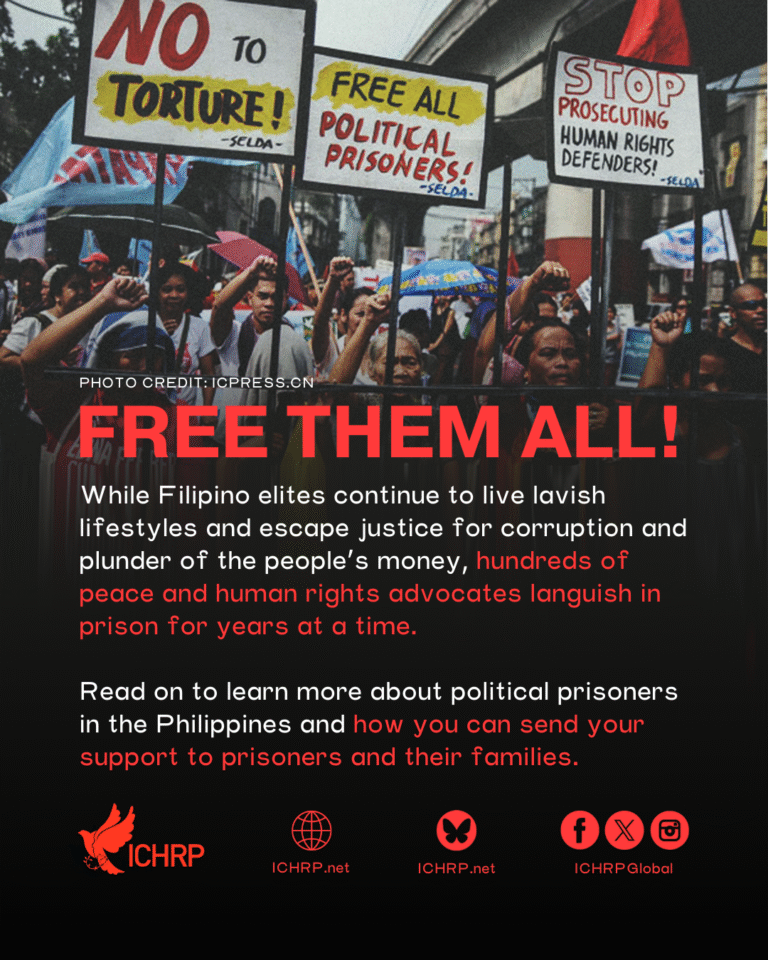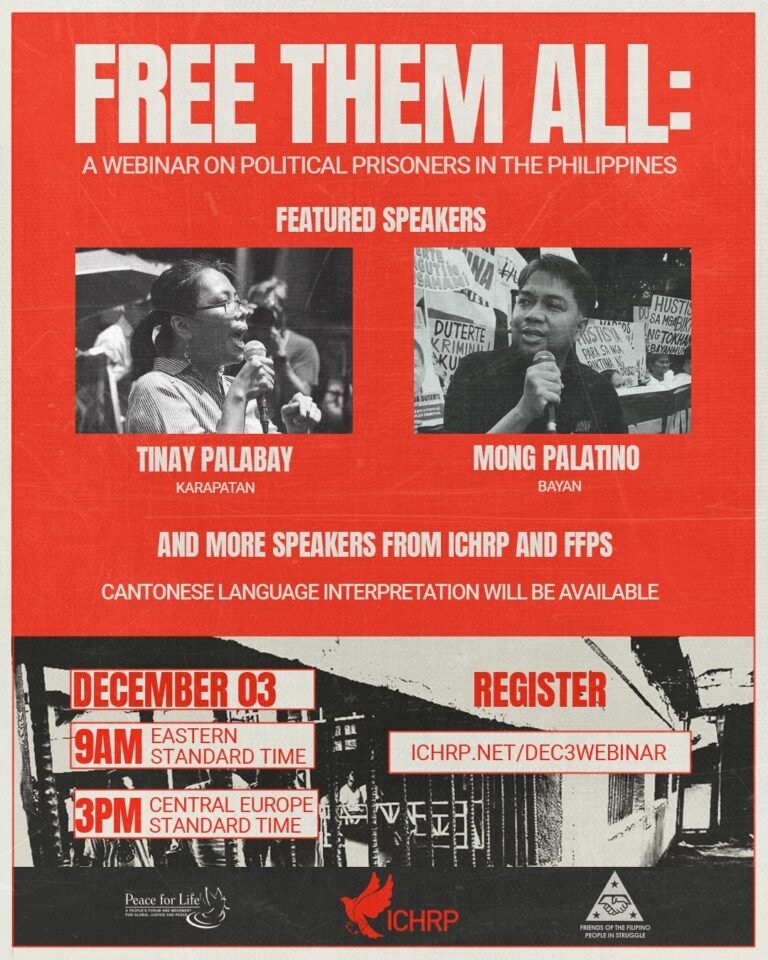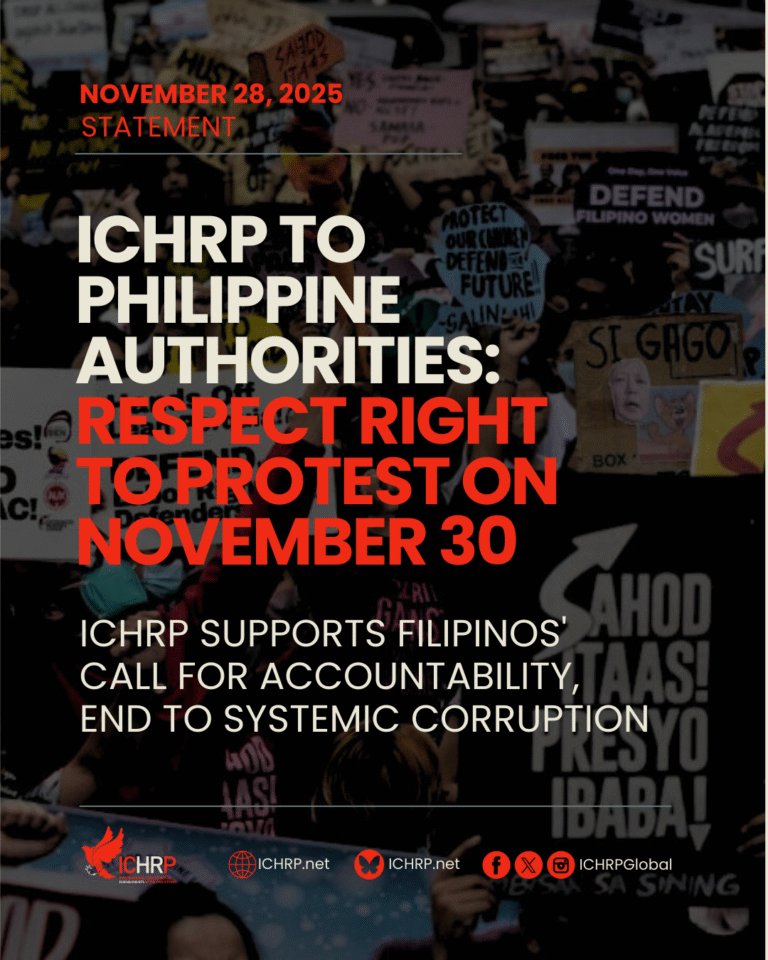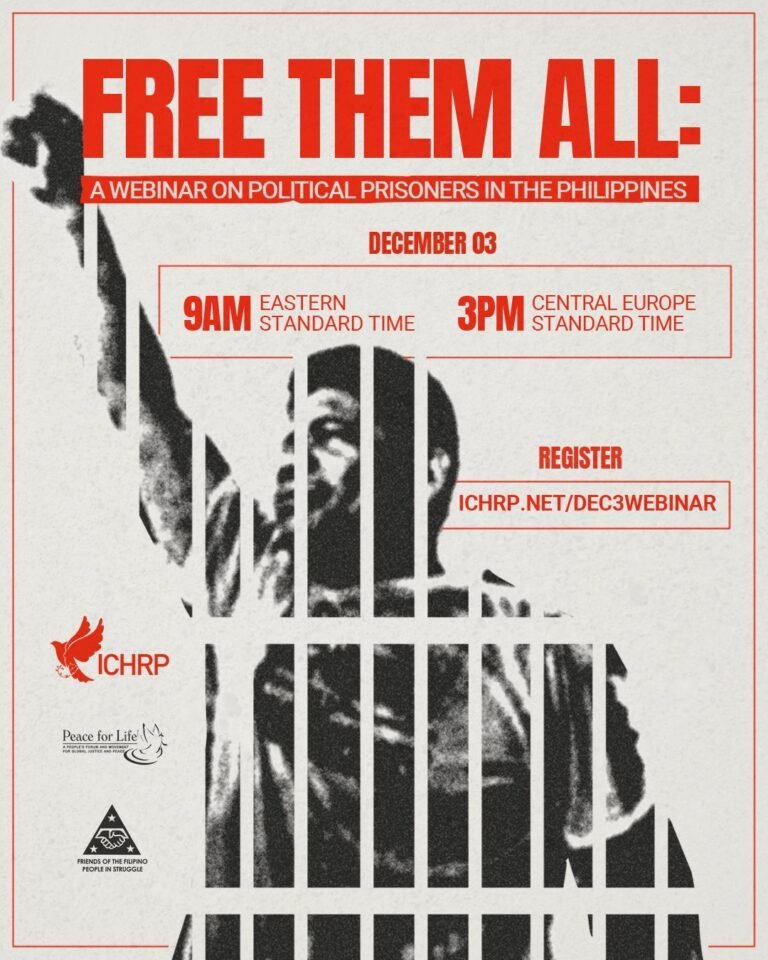ICHRP supports Filipinos’ call for accountability, an end to systemic corruption
News Release
November 28, 2025
“We call on the Philippine government to uphold and respect the Filipino people’s right to protest in the upcoming November 30 nationwide anti-corruption rallies,” said the International Coalition for Human Rights in the Philippines (ICHRP).
“We are well aware of the authorities’ veiled and outright threats against those who will participate in the upcoming protests. The right to assembly is enshrined in the United Nations Declaration of Human Rights, to which the Philippines is a signatory,” said ICHRP Chairperson Peter Murphy. “The government should cease intimidating the people who have every right to be angry about the massive corruption that has been exposed.”
The Philippine National Police (PNP) repeatedly cautioned that Mendiola Bridge and areas surrounding Malacañang Palace remain “strictly off-limits to protest activity or mass gatherings.” Rights advocates say that the right to protest should not be restricted, especially since Mendiola is a site of historical and political significance.
ICHRP said these warnings mirror the September 21 crackdown, when more than 200 individuals were arrested during large mobilizations in Luneta and Mendiola. “We’ve already witnessed how heavy-handed police operations can become,” ICHRP said. “People were arrested, injured, and harassed, including minors and bystanders who weren’t even part of the protest.” Over 400,000 people took part in the September 21 protest, nationwide. There have been almost daily strikes by university students and many rallies by urban poor communities since then.
Authorities have also threatened those participating in the protests that they may face charges of “acts of rebellion, insurrection, sedition or incitement,” under Batas Pambansa 880 and the Revised Penal Code.
Also, police issued a fresh advisory warning protesters against wearing balaclavas or other face coverings, after the Manila city government imposed a controversial ban earlier this month. ICHRP criticized the move as another potential ground for police to apprehend demonstrators.
“People should not have to fear being arrested for simply expressing dissent,” ICHRP said. “Instead of escalating threats, the government should try listening to the protesters and their demands. Filipinos are well within their rights to freely speak out against corruption and for accountability.”
Global solidarity for Filipinos
The rights group supports the Filipino people’s demand for accountability from the Marcos Jr. administration and corrupt officials over the theft of funds for flood control and infrastructure projects. Reports indicate that 60 percent of the P2.2 trillion allocated for flood mitigation since 2020 has been stolen, with credible allegations that billions have reached the President.
That 60 per cent amounts to P1.32 trillion (USD 22.4 billion). “No wonder there was a magical frenzy of vote buying in the May 2025 mid-term elections – the politicians were ‘buying’ the voters with public funds,” Murphy pointed out. “The people from one end of the country to the other cannot be fooled about their own experience of poverty and multiple terrible flooding events,” he added.
Testimony presented before a Senate committee and the Independent Committee on Infrastructure has alleged that around P57.9 billion from construction contracts may have been funneled to former Senate President Chiz Escudero, Senators Jinggoy Estrada and Joel Villanueva, and President Ferdinand Marcos Jr. According to the testimony, contractors allegedly moved van loads of cash to former Albay Rep. Zaldy Co, who purportedly acted as a conduit for delivering the money to then House Speaker Martin Romualdez and President Marcos Jr. These revelations expose only a tiny part of the stolen funds.
Co was previously chair of a small but powerful appropriations committee in congress that inserted items in the budget through a closed-door and secretive process.
According to the rights group, this is now a major political crisis in the Philippines, which could lead to the removal of both the President, Ferdinand Marcos Jr, and his political rival, the Vice-President Sara Duterte. In that circumstance, the New Patriotic Alliance (BAYAN) is calling for a Transitional Council, that excludes Marcos and Duterte loyalists, to govern until fresh, clean elections can be held.
“November 30 is Bonifacio Day, celebrating a working class anti-colonial national hero,” said Murphy. “This is a fitting day for the people to demand real accountability for the grand theft of public funds now exposed in the flood mitigation project scandal, and to demand fundamental change to the system that allows this.
“As a human rights organization, ICHRP works to uphold the rights of the Filipino people. It has mobilized missions to document human rights and international humanitarian law violations in the rural areas, where citizens are most affected by man-made disasters, military repression and corruption. We call on the international community to support the people’s movement against systemic corruption and their fight for genuine social change. We will continue to strengthen our solidarity with the Filipino people,” ended Murphy.
For more information or to request interviews, please contact:
Peter Murphy, ICHRP Chairperson, +61418312301,
Philippine Contact: ICHRP +63 927 987 2842 (WhatsApp/Viber)
Or use the contact form at ichrp.net/contact








